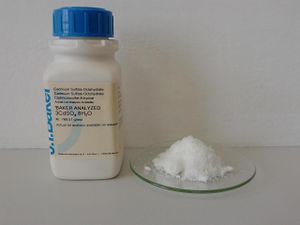Difference between revisions of "Cadmium sulfate"
(Created page with "{{Chembox | Name = Cadmium sulfate | Reference = | IUPACName = Cadmium(II) sulfate | PIN = | SystematicName = | OtherNames = Cadmium monosulfate<br>Cadmium sulphate <!-- Image...") |
|||
| (One intermediate revision by the same user not shown) | |||
| Line 115: | Line 115: | ||
==Properties== | ==Properties== | ||
===Chemical=== | ===Chemical=== | ||
| − | Cadmium sulfate can be substituted by a more reactive metal, such as aluminium to [[aluminium sulfate]]: | + | Cadmium sulfate can be substituted by a more reactive metal, such as [[aluminium]] to [[aluminium sulfate]]: |
:3 CdSO<sub>4</sub> + 2 Al → 3 Cd + Al<sub>2</sub>(SO<sub>4</sub>)<sub>3</sub> | :3 CdSO<sub>4</sub> + 2 Al → 3 Cd + Al<sub>2</sub>(SO<sub>4</sub>)<sub>3</sub> | ||
| Line 150: | Line 150: | ||
===Storage=== | ===Storage=== | ||
| − | Cadmium sulfate should be stored in closed plastic or glass bottles, in a hazardous chemical cabinet. If the | + | Cadmium sulfate should be stored in closed plastic or glass bottles, in a hazardous chemical cabinet. If the anhydrous form is desired, it should be stored in air-tight containers. |
===Disposal=== | ===Disposal=== | ||
Latest revision as of 16:41, 28 October 2018
 Cadmium sulfate octahydrate
| |
| Names | |
|---|---|
| IUPAC name
Cadmium(II) sulfate
| |
| Other names
Cadmium monosulfate
Cadmium sulphate | |
| Properties | |
| CdSO4 (anhydrous) CdSO4·H2O (monohydrate) CdSO4·4H2O (tetrahydrate) 3CdSO4·8H2O (octahydrate) | |
| Molar mass | 208.47 g/mol (anhydrous) 226.490 g/mol (monohydrate) 769.546 g/mol (octahydrate) |
| Appearance | White hygroscopic solid |
| Odor | Odorless |
| Density | 4.691 g/cm3 (anhydrous) 3.790 g/cm3 (monohydrate) 3.080 g/cm3 (octahydrate) |
| Melting point | 1000 (anhydrous) (decomposes) 105 °C (monohydrate) (decomposes) 40 °C (octahydrate) (decomposes) |
| Boiling point | Decomposes |
| anhydrous: 75.0 g/100 mL (0 °C) 76.4 g/100 mL (25 °C) 58.4 g/100 mL (99 °C) monohydrate: 76.7 g/100 mL (25 °C) octahydrate: very soluble | |
| Solubility | Slightly soluble in methanol, ethyl acetate Insoluble in ethanol, toluene, xylene |
| Thermochemistry | |
| Std molar
entropy (S |
123 J·mol−1·K−1 |
| Std enthalpy of
formation (ΔfH |
−935 kJ·mol−1 |
| Hazards | |
| Safety data sheet | Sigma-Aldrich |
| Flash point | Non-flammable |
| Lethal dose or concentration (LD, LC): | |
| LD50 (Median dose)
|
280 mg/kg (oral, rat) |
| Related compounds | |
| Related compounds
|
Zinc sulfate Mercury(II) sulfate |
| Except where otherwise noted, data are given for materials in their standard state (at 25 °C [77 °F], 100 kPa). | |
| Infobox references | |
Cadmium sulfate is the chemical compound with the chemical formula CdSO4. While it exists in anhydrous form, it's generally encountered as octahydrate (3CdSO4·8H2O).
Cadmium sulfate can be found in nature as the rare mineral drobecite (CdSO4·4H2O). It is also a component of the rare mineral niedermayrite, which is hydrated copper cadmium sulfate hydroxide.
Contents
Properties
Chemical
Cadmium sulfate can be substituted by a more reactive metal, such as aluminium to aluminium sulfate:
- 3 CdSO4 + 2 Al → 3 Cd + Al2(SO4)3
Physical
Cadmium sulfate is a colorless, hygroscopic odorless salt, very soluble in water. It exists as mono-, tetra- and octahydrated form.
Availability
Cadmium sulfate can be purchased from chemical suppliers.
It can be found in nature in the rare minerals drobecite and niedermayrite.
Due to its toxicity, its sale may be restricted in many places.
Preparation
Cadmium sulfate can be prepared by dissolving cadmium oxide into sulfuric acid.
- CdO + H2SO4 → CdSO4 + H2O
Using cadmium metal is not recommended, as a layer of cadmium sulfate forms on the surface of the metal which slows its dissolution.
Anhydrous cadmium sulfate can be made by reacting sodium persulfate with cadmium metal.
- Cd + Na2S2O8 → CdSO4 + Na2SO4
Projects
- Electroplate cadmium metal
- Make a Weston cell
- Make cadmium sulfide
Handling
Safety
Being a soluble cadmium compound, it is very toxic and highly carcinogenic. Wear proper protection when handling it. Always wear gloves!
Storage
Cadmium sulfate should be stored in closed plastic or glass bottles, in a hazardous chemical cabinet. If the anhydrous form is desired, it should be stored in air-tight containers.
Disposal
Cadmium should be converted into insoluble form, like cadmium sulfide and taken to hazardous disposal centers.